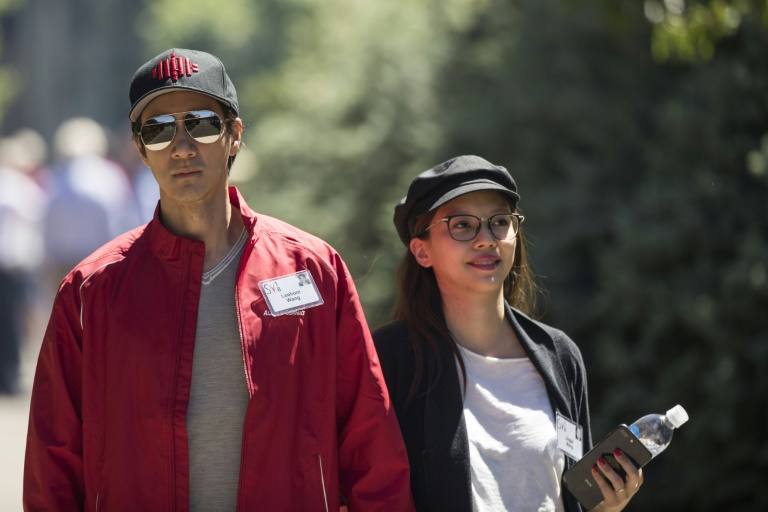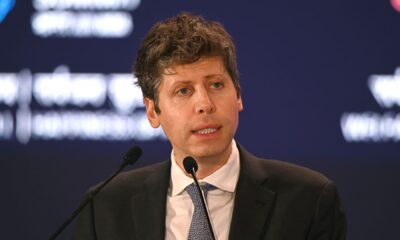SOCIAL
Taiwanese pop star’s messy divorce captures Chinese internet

The online war of words between Taiwanese-American pop idol Wang Leehom and his now ex-wife Lee Jinglei has exploded in recent days – Copyright GETTY IMAGES NORTH AMERICA/AFP Drew Angerer
Laurie CHEN
A Taiwanese pop star’s messy divorce has captivated the Chinese-speaking world with the allegations triggering debate on misogyny and abusive marriages in China, where social media discussion of women’s rights is increasingly tightly controlled.
The online war of words between Taiwanese-American pop idol Wang Leehom and his estranged wife Lee Jinglei has exploded in recent days, generating breathless tabloid coverage and daily social media fodder across China, Taiwan and Hong Kong.
It has also triggered none of the Chinese mainland’s censorship that kicked in when tennis star Peng Shuai alleged she had been sexually assaulted by a senior Communist Party official last month.
Lee’s anguished posts about her imploding marriage to Wang — one of Mandopop’s most recognisable crooners — have struck a chord with many women who empathised with her detailed accounts of alleged mistreatment.
The spat exploded last Friday, days after Wang announced his divorce to 68 million followers on the Chinese social media platform Weibo.
Lee then posted a 5,000-word letter alleging Wang’s emotional abuse and serial infidelity during the course of their eight-year marriage, demolishing his previously squeaky-clean image.
She also accused Wang of seeing sex workers and repeatedly cheating on her while she raised their three children at the expense of her career.
A former JP Morgan analyst, Lee studied at Princeton and Columbia University in New York Taiwanese media reported, before marrying Wang aged 27.
“One of the reasons I decided to speak out was because I don’t want any more women to experience the same things I did,” Lee wrote in a Weibo post that gained over 12 million likes.
Wang denied allegations of cheating and accused Lee of coercing him into marriage in a separate Weibo statement as his father also waded into the spat, sparking threats of legal action.
– Misogyny debate –
The saga took yet another turn early Monday morning when Lee accused Wang of gaslighting her, with the search term “gaslighting” trending in China, Hong Kong and Taiwan.
Wang finally apologised in a Monday Weibo post in which he said he took “all responsibility” and announced a temporary break from the music industry.
Chinese-speaking users have largely thrown their support behind Lee — giving her the nickname “Thor”, a phonetic pun on her name that invokes the beloved Marvel superhero and fearsome Norse god of thunder.
Multiple brands also dropped Wang, who is believed to have left China.
And the allegations triggered debate on misogyny and abusive marriages in China, where social media discussion of women’s rights is increasingly tightly controlled.
“If more women dare to expose their wounds through speaking out instead of tolerating them, there would be less misogyny in society,” a feminist blogger wrote in a viral WeChat essay titled: “Thank you Lee Jinglei for making society a bit less misogynistic”.
Chinese feminists also hailed Lee’s bravery on social media.
“Women’s speech and their right to public opinion are of vital importance. (Lee Jinglei) finally took a courageous first step,” said a feminist campaigner in Beijing who wished to remain anonymous.
The currently unfettered online discussion contrasts sharply with the blanket censorship of allegations by tennis star Peng.
Hers is the highest-profile allegation from China’s fledgling #MeToo movement, which has been heavily suppressed by domestic authorities but received significant international attention.
After weeks of no word, Peng resurfaced in a series of highly stage-managed public appearances, denying ever making a sexual assault claim.
But the Women’s Tennis Association said it still had “significant concerns” about her “well-being and ability to communicate without censorship or coercion”.
– Celebs behaving badly –
Wang’s divorce comes as Chinese authorities carry out a wide-ranging morality crackdown on the entertainment industry. And the public spat has not escaped the notice of the Communist Party’s disciplinary watchdog.
“The example of ‘celebrity trainwrecks’ repeatedly demonstrates that people pay attention to public figures’ every word and deed, and each create an impact on society,” the Central Committee for Discipline Inspection said Sunday.
Over the summer several Chinese celebrities have been publicly disgraced and blacklisted from the industry over “immoral” conduct.
Chinese-Canadian singer Kris Wu was charged with rape by Beijing police in August, while actress Zheng Shuang was hit with a $46 million fine for tax evasion the same month.
More recently, Chinese pianist Li Yundi was detained by Beijing police for allegedly soliciting a sex worker.
Chinese President Xi Jinping emphasised at an arts symposium earlier this month that performers should strive for “moral integrity”, while several government arts and internet regulatory bodies have issued orders to “resist illegal and unethical artists”.
Source link

















You must be logged in to post a comment Login